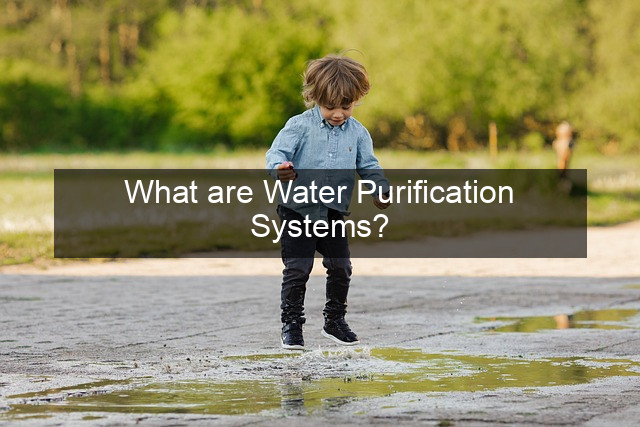What are Water Purification Systems?

- What are Water Purification Systems?
- What are Water Purification Systems?
- Types of Water Purification Systems
- Reverse Osmosis Systems
- Ultraviolet (UV) Water Purifiers
- Activated Carbon Filters
- Benefits of Using Water Purification Systems
- Healthier Drinking Water
- Improved Taste and Odor
- Cost Savings
- Choosing the Right Water Purification System
- Assessing Your Water Quality
- Considering Your Budget
- Maintenance Requirements
- Conclusion
- Frequently Asked Questions
- What is the most effective water purification method?
- How often should I replace my water filter?
- Are water purification systems expensive?

What are Water Purification Systems?
Access to clean, safe drinking water is a fundamental human right, yet millions worldwide struggle with contaminated water sources. From invisible microbes to harmful chemicals, the threats lurking in untreated water can have devastating consequences for our health. This is where water purification systems step in, offering a vital barrier against these dangers. Water purification systems are designed to remove impurities and contaminants, transforming potentially harmful water into a safe and healthy resource. These systems vary widely in complexity and effectiveness, ranging from simple filters to sophisticated multi-stage processes. Understanding the different types of water purification systems, their benefits, and how they work is crucial for making informed decisions about protecting your family’s health and well-being.
Whether you rely on municipal water or a private well, a water purification system can provide an added layer of security and peace of mind. In this comprehensive guide, we’ll delve into the world of water purification, exploring the various technologies available and helping you choose the best solution for your specific needs. From removing sediment and chlorine to eliminating bacteria and viruses, water purification systems play a critical role in ensuring access to clean, healthy water for drinking, cooking, and other household uses. Join us as we explore the science behind these essential systems and discover how they can safeguard your health.
Types of Water Purification Systems
Reverse Osmosis Systems
Reverse osmosis (RO) systems are highly effective at removing a wide range of contaminants. They utilize a semi-permeable membrane to filter out impurities based on size and charge. This process effectively removes dissolved salts, minerals, heavy metals, and other harmful substances, leaving behind clean, purified water.
RO systems are particularly effective in areas with hard water or high levels of dissolved solids. They are also a popular choice for households concerned about removing specific contaminants like lead or arsenic. While highly effective, RO systems can be more expensive than other filtration methods and may require professional installation.
The RO process involves forcing water through the membrane under pressure, leaving the contaminants behind. The purified water is then collected, while the wastewater containing the removed impurities is discharged.
Ultraviolet (UV) Water Purifiers
UV water purifiers use ultraviolet light to neutralize bacteria, viruses, and other microorganisms. The UV light disrupts the DNA of these pathogens, rendering them incapable of reproduction and effectively eliminating the threat of waterborne illnesses.
UV purification is a chemical-free method that doesn’t alter the taste or odor of the water. It is often used in conjunction with other filtration methods to provide comprehensive water purification. UV systems are relatively low maintenance and have a long lifespan, making them a cost-effective option for microbial disinfection.
While effective against microorganisms, UV purification does not remove sediment, chlorine, or other chemical contaminants. Therefore, it is often paired with pre-filtration systems to address these issues.
Activated Carbon Filters
Activated carbon filters are widely used for their ability to remove chlorine, sediment, and other impurities that affect the taste, odor, and color of water. The porous nature of activated carbon allows it to adsorb these contaminants, trapping them within the filter media.
These filters are available in various forms, including pitcher filters, faucet filters, and whole-house systems. They are a cost-effective solution for improving water quality and are particularly effective at removing chlorine, which can impart an unpleasant taste and odor to drinking water.
Activated carbon filters are generally low maintenance and easy to replace. However, they are not effective at removing dissolved minerals, heavy metals, or microorganisms.
Benefits of Using Water Purification Systems
Healthier Drinking Water
The primary benefit of using a water purification system is access to healthier, safer drinking water. By removing contaminants and impurities, these systems protect against waterborne illnesses and the potential health risks associated with consuming contaminated water.
Clean drinking water is essential for maintaining proper hydration and overall health. Water purification systems ensure that the water you consume is free from harmful bacteria, viruses, and chemicals.
Investing in a water purification system can contribute to improved health and well-being for you and your family.
Improved Taste and Odor
Water purification systems can significantly improve the taste and odor of your water. By removing chlorine, sediment, and other impurities, these systems enhance the palatability of drinking water, making it more refreshing and enjoyable.
Many people find that purified water tastes cleaner and fresher than untreated tap water. This can encourage increased water consumption, which is essential for maintaining optimal health.
Improved taste and odor can also enhance the flavor of beverages and cooked foods prepared with purified water.
Cost Savings
While there is an initial investment involved in purchasing a water purification system, it can lead to cost savings in the long run. By reducing the need for bottled water, you can save money and reduce your environmental impact.
Bottled water can be expensive, and the plastic bottles contribute to environmental pollution. A water purification system provides a sustainable and cost-effective alternative.
The long-term cost savings can quickly offset the initial investment, making water purification a financially sound decision.
Choosing the Right Water Purification System
Assessing Your Water Quality
Before choosing a water purification system, it’s essential to assess your water quality. A water test can identify specific contaminants present in your water supply, allowing you to choose a system that effectively addresses your needs.
Water testing kits are readily available and can provide valuable insights into the quality of your water. This information is crucial for selecting the appropriate purification method.
Understanding your water quality will help you determine which type of system is best suited for your specific circumstances.
Considering Your Budget
Water purification systems vary in price, so it’s essential to consider your budget when making a decision. While some systems can be expensive, there are also affordable options available that can effectively improve water quality.
Determine how much you are willing to invest in a purification system and explore the options within your price range. There are effective solutions available at various price points.
Balancing cost and effectiveness is key to finding the right water purification system for your needs.
Maintenance Requirements
Different water purification systems have varying maintenance requirements. Some systems require regular filter changes, while others may need professional servicing. Consider the maintenance needs of each system before making a purchase.
Choose a system that fits your lifestyle and maintenance capabilities. Some systems are easier to maintain than others, so consider this factor when making your decision.
Proper maintenance is crucial for ensuring the effectiveness and longevity of your water purification system.
| Purification Method | Contaminants Removed | Maintenance |
|---|---|---|
| Reverse Osmosis | Dissolved salts, minerals, heavy metals | Membrane replacement, periodic cleaning |
| UV Purification | Bacteria, viruses, microorganisms | UV lamp replacement |
| Activated Carbon | Chlorine, sediment, taste and odor impurities | Filter replacement |
- Always consult with a water treatment specialist for personalized recommendations.
- Regularly test your water quality to ensure the effectiveness of your purification system.
- Follow the manufacturer’s instructions for maintenance and filter replacement.
Conclusion
Water purification systems play a crucial role in ensuring access to safe and healthy drinking water. With a variety of technologies available, choosing the right system depends on your specific needs and water quality concerns. By understanding the different types of systems, their benefits, and their limitations, you can make an informed decision that protects your health and well-being.
Investing in a water purification system is an investment in your health and the health of your family. From simple filters to advanced RO systems, there is a solution available for every household. By taking the time to research and choose the right system, you can enjoy the peace of mind that comes with knowing your drinking water is clean, safe, and free from harmful contaminants. Remember to regularly test your water quality and maintain your system properly to ensure its continued effectiveness.
Frequently Asked Questions
What is the most effective water purification method?
The most effective method depends on the specific contaminants present in your water. Reverse osmosis is generally considered the most comprehensive, removing a wide range of impurities.
How often should I replace my water filter?
Filter replacement frequency varies depending on the type of filter and usage. Consult the manufacturer’s recommendations for specific guidance.
Are water purification systems expensive?
The cost of water



